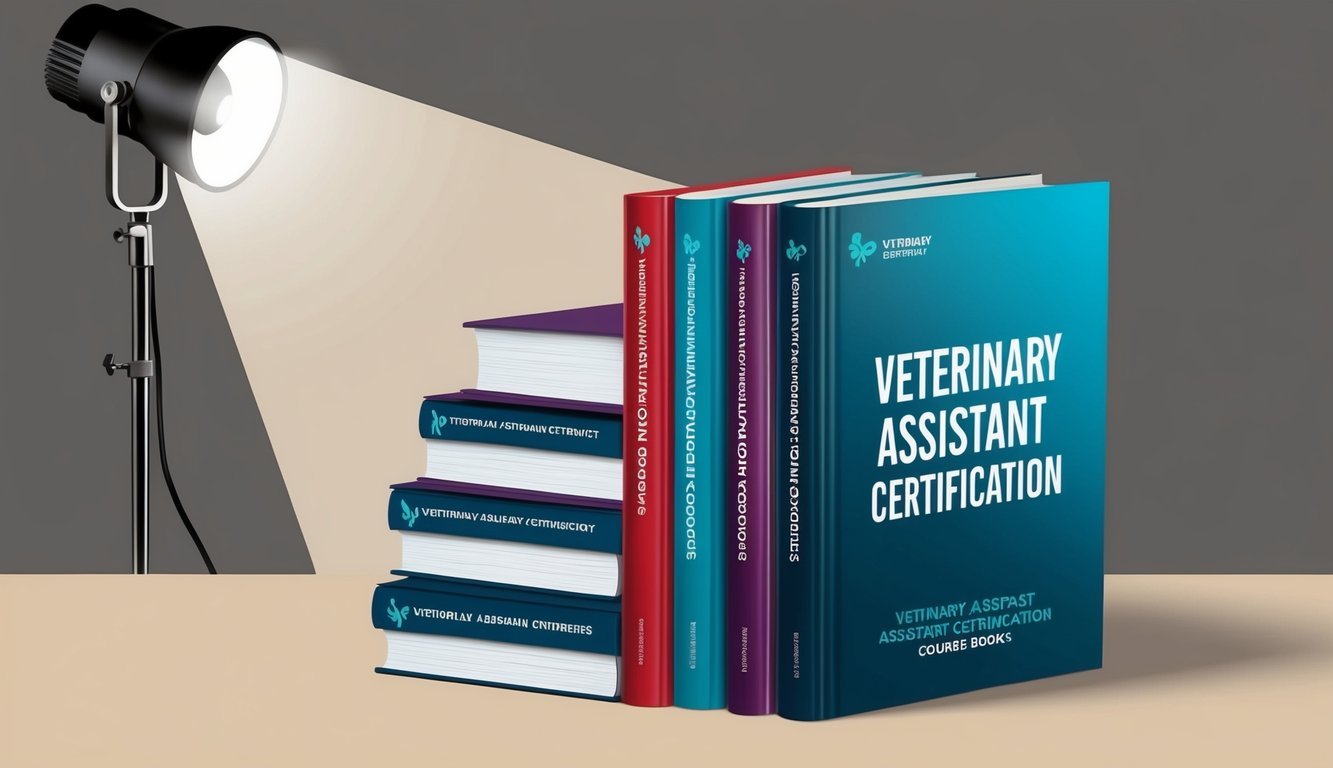Thinking about becoming a vet assistant? You’re in for a treat! It’s a fantastic way to work with animals and help keep them healthy and happy.
In a vet clinic or animal hospital, you’ll find yourself jumping into all sorts of tasty tasks that make a difference in furry lives.

Getting certified can seriously boost your chances of landing a solid job in this field. There are several top-quality online programs out there that can equip you with the skills and knowledge you need.
These courses let you learn at your own pace, which is perfect if you’re juggling a busy life.
1) Purdue University’s Veterinary Technology Program

Hey! Is being a vet tech calling your name? Well, Purdue University has your back with their incredible Veterinary Technology Distance Learning program.
This program is just the ticket if you’re ready to dive into the world of veterinary care.
It’s part-time, which means you can keep your day job while soaking up knowledge.
You’ll get to tackle 27 different courses and rack up 18 hands-on clinical mentorships! It’s like a smorgasbord of veterinary know-how!
Just remember, it’s not a full-time gig, so you’ll need some patience as you work through it.
Plus, financial aid options might be a bit tight, so keep an eye on your budget.
Purdue also offers live info sessions via Zoom, where you can toss your burning questions at them.
It’s a great way to see if this program fits you.
2) Penn Foster Veterinary Assistant Program
Are you itching to work with animals but unsure of where to kick things off? The Penn Foster Veterinary Assistant Program might just be your perfect match.
This online course lets you learn at your own pace—perfect for busy bees!
The program covers all the basics, from animal care to lab procedures and assisting during exams and treatments.
It’s designed to get you all set for entry-level roles in vet clinics or animal hospitals.
And here’s a fun fact: Penn Foster is approved by NAVTA (National Association of Veterinary Technicians in America).
That’s a biggie in the vet world, meaning your training meets industry standards.
The curriculum includes 10 courses plus an externship.
You’ll tackle topics like animal anatomy, medical terminology, and office procedures.
That externship? It’s golden, giving you hands-on experience that future employers will love.
If you’re in a hurry, you can finish in as little as 12 months, but the average completion time is around 16 months.
Either way, you’ll be on track to a fulfilling career helping animals before you know it!
3) Texas A&M Veterinary Assistant Certificate

Curious about becoming a certified veterinary assistant? Texas A&M has a fantastic option for you with their Veterinary Science Certificate Program.
It’s open for anyone 12 and up, so if you’re thinking of starting your animal care journey early, this is a great way to go!
You’ll cover everything from animal health to diseases and basic vet procedures.
The flexibility allows you to go at your own pace—a blessing if you have a packed schedule or other commitments.
To get certified, you’ll need to clock in 225 clinical hours and 200 classroom hours.
The good news? You can do this through self-study or even as part of a homeschool program.
Once you’re all set, you can take the Veterinary Assistant Certificate Examination.
Pass it, and hello, you’re officially a Veterinary Assistant!
The cherry on top? This program can pave the way for future opportunities.
If you’re aiming to become a vet tech or even a full-blown veterinarian, this certificate is an excellent starting point.
4) Animal Behavior College Veterinary Assistant Program
Thinking about becoming a vet assistant without saying farewell to your day job? The Animal Behavior College Veterinary Assistant Program could be just what you need.
This online option fits snugly into any schedule.
The program is broken down into 11 stages.
You’ll get to learn about office etiquette, veterinary procedures, and much more.
Plus, you’ll watch 47 educational videos to help you nail the material.
And here’s the kicker—there’s a hands-on externship at the end.
You’ll obtain real-world experience working with animals in a veterinary environment.
Worried about the cost? ABC offers tuition that’s often more budget-friendly than many other schools.
Depending on your payment plan, you’ll be looking at costs between $2,285 and $3,040, covering all materials for both the home study and hands-on training.
Once you’ve completed the course, you’ll be well-equipped to turn your dream of helping animals into reality.
You’ll have the skills to work in various veterinary settings and truly make a difference in the furry lives you touch.
Understanding Veterinary Assistant Certifications
Getting certified as a vet assistant can be a real game-changer for your career.
It shows potential employers that you mean business and possess solid training.
Why Certification Matters
Certification is like your badge of honor.
It tells vets and clinics that you have the right skills to help care for animals.
Lots of places prefer or even require certified assistants.
Being certified can lead to better pay and more job opportunities.
You’ll learn the latest best practices in animal care, keeping you updated in a field that’s always evolving.
Many employers simply prefer candidates with specialized training, giving you a leg up in the job market.
Plus, considering NICU nursing certification courses can enhance your expertise, especially if you’re keen on neonatal care.
Gaining that certification shows you’re committed to professional growth and delivering top-notch care.
Different Types of Certifications
The main certification for vet assistants is the Approved Veterinary Assistant (AVA) from NAVTA.
To get this badge, you need to finish an approved program and pass an exam.
Some schools offer their own certificates, and while these can be great, make sure they’re recognized by local vets.
For instance, Penn Foster’s program is NAVTA-approved, which means it prepares you for the AVA exam.
Online programs are becoming quite popular since they let you study when it suits you.
Both the University of Houston and the University of Tennessee offer excellent online vet assistant courses.
They’re a fantastic choice if you’re juggling a hectic life.
Choosing the Right Course

Picking the right veterinary assistant certification course can feel like a head-scratcher.
You’ll want to weigh some key factors and decide if you’re leaning toward online or in-person options.
Factors to Consider
When checking out vet assistant programs, make sure they’re NAVTA-approved.
This means the course meets high standards.
Don’t forget to consider the cost, as programs can vary from a few hundred to a few thousand dollars.
Look at how long the course will take.
Some can be wrapped up in just a few months, while others might stretch over a year or more.
Also, check what’s included—do you get hands-on practice? Will they help you find an externship?
Your schedule is key, too.
If you’re employed full-time, you might need the flexibility of an online program.
But if in-person learning suits you better, go for the local options!
Online vs. In-Person Learning
Online vet assistant courses offer remarkable flexibility.
You can typically study at your own pace, weaving lessons into your life as you see fit.
Many online programs come with virtual labs and videos to help you grasp hands-on skills.
On the flip side, in-person courses give you the chance to work with real animals and equipment.
You get instant feedback from instructors, making it easy to ask those burning questions you might have.
Some schools even offer a blend of online and physical learning.
Think about how you best absorb information.
If you’re self-motivated, the online route could be your jam.
If you’re craving more structure, in-person classes may be the way to go.
Remember, both paths can lead to certification, so choose what fits your life and learning style!
Career Impact of Certification

Getting your paws on that certification as a veterinary assistant can unlock some amazing doors in your career.
It can enhance your job prospects and even propel you toward higher pay.
Let’s break down how certification might shape your career journey.
Job Opportunities
Certification can help you shine to employers.
Many vet clinics are keen to hire certified assistants.
With a NAVTA-approved certification, you’ll definitely have an edge over non-certified candidates.
You’ll find work in:
- Animal hospitals
- Private vet practices
- Zoos
- Research labs
Certification might even get you chosen for more exciting tasks.
You could be assisting with surgeries or tackling lab work, and some clinics reserve certain responsibilities just for certified staff.
Potential Salary Increase
Certification can give your earning potential a nice boost.
While figures can vary widely, certified vet assistants generally earn more than their non-certified peers.
The median salary for vet assistants was around $34,740 in 2022.
But with certification, you might just rise above that.
Some perks that come with certification include:
- Higher starting pay
- Faster raises
- Better benefits
Your salary could even increase as you gain experience, with some certified assistants stepping up to supervisor or specialized roles where they can earn even more.
Frequently Asked Questions

Vet assistant programs are often packed with questions.
Let’s tackle some of the common ones about getting certified, earnings, and top online options.
What are some accredited online veterinary assistant programs?
You’ve got fantastic choices! Purdue University’s Veterinary Technology Program offers solid training.
Check out the Penn Foster Veterinary Assistant Program, or don’t miss Texas A&M’s Veterinary Assistant Certificate and Animal Behavior College’s Veterinary Assistant Program.
Can you become a certified veterinary assistant for free through online courses?
Finding a free certification can be tricky.
Most quality programs do come with a cost.
But hey, some clinics offer on-the-job training that can lead to certification!
What is AVA certification, and how does it relate to vet assistants?
AVA stands for Approved Veterinary Assistant, a credential given by the National Association of Veterinary Technicians in America (NAVTA).
Getting AVA certified demonstrates you’ve completed an approved training program.
How much can a top veterinary assistant expect to earn?
Your earnings as a vet assistant can vary widely.
According to the Bureau of Labor Statistics, the median salary was about $34,740 in May 2022, roughly $16.70 per hour.
What are the requirements to become a credentialed veterinary assistant?
To step into the role of a credentialed vet assistant, you typically need a high school diploma or GED.
From there, you’ll want to complete an approved training program.
Some employers may ask for certification or relevant on-the-job experience.
Is Penn Foster a reputable option for pursuing a vet assistant certification?
Absolutely! Penn Foster is a solid choice for vet assistant training.
Their online program is flexible and affordable, and many students find it a great fit for their needs.

